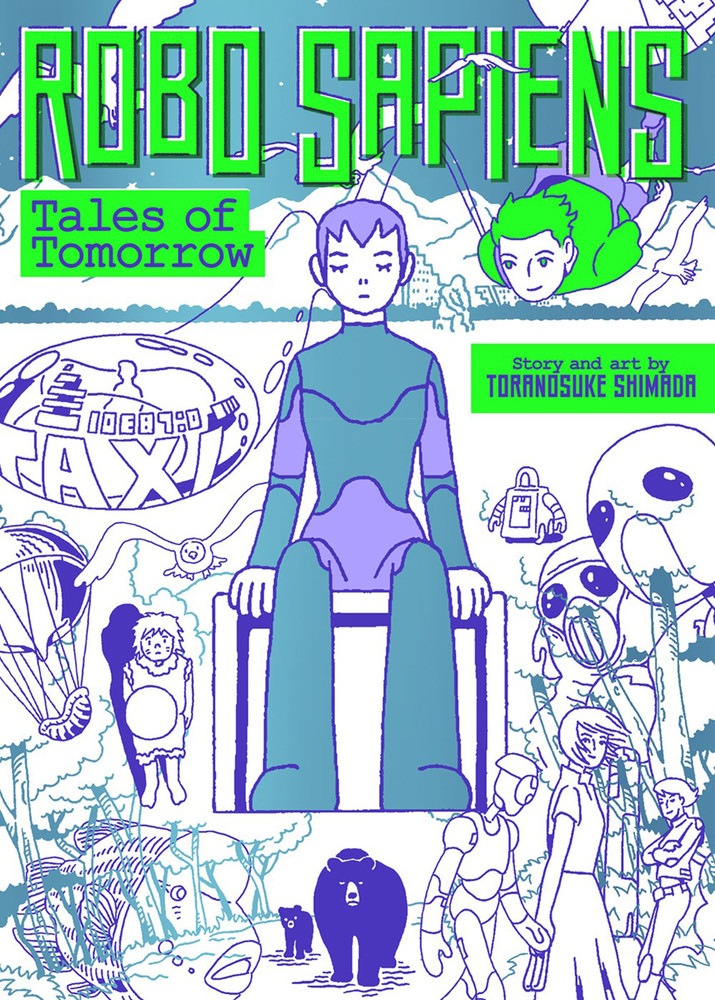 This year’s Eisner nominations have just been announced. In the Best U.S. Edition of International Material—Asia category, VIZ Media garnered five of the six nominations with crowd-pleasers such as Chainsaw Man and Spy x Family, while Seven Seas nabbed one for Robo Sapiens: Tales of Tomorrow. The only other manga nominated for an Eisner was Zom 100: Bucket List of the Dead, which is competing in the Best Humor Publication category. Also nominated for an Eisner is Eike Exner’s Comics and the Origins of Manga: A Revisionist History, which was published by Rutgers University Press last year.
This year’s Eisner nominations have just been announced. In the Best U.S. Edition of International Material—Asia category, VIZ Media garnered five of the six nominations with crowd-pleasers such as Chainsaw Man and Spy x Family, while Seven Seas nabbed one for Robo Sapiens: Tales of Tomorrow. The only other manga nominated for an Eisner was Zom 100: Bucket List of the Dead, which is competing in the Best Humor Publication category. Also nominated for an Eisner is Eike Exner’s Comics and the Origins of Manga: A Revisionist History, which was published by Rutgers University Press last year.
MANGA NEWS
Big news from Seven Seas! The company has just launched two imprints: Seven Seas BL, which will publish works in the BL/Boys’ Love genre, and Seven Seas GL, which will publish works in the GL/Girls’ Love (yuri) genre. [Seven Seas]
The final chapter in Wataru Hinekure’s My Love Mix-Up! will run in the June issue of Bessatsu Margaret. [Anime News Network]
Brigid Alverson previews three new shonen titles that debut in July. [ICv2]
Over at Book Riot, Carina Pereira highlights eight of the summer’s most anticipated graphic novels. [Book Riot]
How do librarians respond book challenges in their communities? Shawn, Megan, and Tayla offer a variety of helpful strategies for handling complaints about graphic novels, from setting clear policies about who can bring a formal complaint to using peer-reviewed sites to demonstrate that your collection is, in fact, age-appropriate. [No Flying, No Tights]
FEATURES AND INTERVIEWS
Looking for a good read? The crack team at ANN have just posted their Spring 2022 Manga Guide. Look for daily updates through the end of this week. [Anime News Network]
Tony explores the complex friendship between Kaguya Shinomiya and Ai Hayasaka in Kaguya-sama: Love Is War. [Drop-In to Manga]
On the latest Manga Mavericks podcast, host Siddharth Gupta convenes a roundtable discussion about Yona of the Dawn with panelists from Anime Feminist, But Why Tho?!, and Good Friends Anime Club. [Manga Mavericks]
Geremy and Kevin round up the latest Shonen Jump chapters, then turn their attention to volume thirteen of Haikyu!! [Jump Start Weekly]
Why did Nobuhiro Watsuki’s Gun Blaze West get the axe after just three volumes? David and Jordan investigate. [Shonen Flop]
Did you know that Tokyopop’s Warriors fandom is still going strong after fifteen years? Patrick Kuklinksi shines a light on the fan-made comics that explore “parts of the books that weren’t detailed in canon,” re-write controversial storylines, and introduce original characters. [SOLRAD]
Megan D. jumps in the WABAC machine for a look at Rumiko Takashi’s Rumic Theater, a collection of short stories that VIZ published more than twenty-five years ago. “What caught my notice about this anthology is that they all feature something you don’t see a lot of in American manga releases: adult women,” she observes. “Every lead character is either a currently married woman (be they with or without children) or one who was married in the past. A lot of their stories are small-scale, focused on their homes and their immediate community of friends and family. True to Takahashi fashion, though, they are also often comical”.” [The Manga Test Drive]
REVIEWS
Are you following Al’s Manga Blog? If not, you should: this review-focused website has been publishing insightful, crisply written essays since 2016. Al’s latest offerings include in-depth reviews of The Music of Marie, a new title by Usamaru Furuya (Short Cuts, Genkaku Picasso); Island in a Puddle, a thriller by Kei Sanabe (Erased); and Sakamoto Days, a new Shonen Jump series by Yutu Suzuki.
Also of note: ANN’s Caitlin Moore draws on her own experiences with ADHD in a thoughtful review of My Brain is Different: Stories of ADHD and Other Developmental Disorders, while Masha Zhdanova posts capsule reviews of three new VIZ titles.
- All-Out!! (Krystallina, Daiyamanga)
- All-Rounder Meguru (Krystallina, Daiyamanga)
- Awkward Silence (Megan D. The Manga Test Drive)
- Boys Run the Riot, Vol. 1 (Seth Smith, Women Write About Comics)
- Devil Ecstasy, Vol. 1 (Demelza, Anime UK News)
- Fly Me to the Moon, Vol. 11 (Josh Piedra, The Outerhaven)
- A Galaxy Next Door, Vol. 1 (Brett Michael Orr, Honey’s Anime)
- Giant Spider & Me: A Post-Apocalyptic Tale (Megan D., The Manga Test Drive)
- Golden Japanesque: A Splendid Yokohama Romance, Vol. 5 (Krystallina, The OASG)
- The Haunted Bookstore, Vol. 1 (SKJAM, SKJAM! Reviews)
- Island in a Puddle, Vol. 1 (King Baby Duck, Boston Bastard Brigade)
- Jujutsu Kaisen, Vols. 14-15 (King Baby Duck, Boston Bastard Brigade)
- Kubo Won’t Let Me Be Invisible, Vol. 1 (Josh Piedra, The Outerhaven)
- The Music of Marie (darkstorm, Anime UK News)
- My Androgynous Boyfriend (Megan D., The Manga Test Drive)
- The Poe Clan, Vol. 1 (Eric Alex Cline, AiPT!)
- Record of Ragnarok, Vol. 1 (Danica Davidson, Otaku USA)
- Rent-A-(Really Shy!)-Girlfriend, Vol. 2 (Demelza, Anime UK News)
- Sakamoto Days, Vol. 1 (Renee Scott, Good Comics for Kids)
- Seaside Stranger, Vol. 2: Harukaze no Étranger (Kate Sánchez, But Why Tho?!)
- Sensei’s Pious Lie, Vol. 1 (Sarah, Anime UK News)
- Short Sunzen (Megan D. The Manga Test Drive)
- Stravaganza (Megan D., The Manga Test Drive)
- To Strip the Flesh (Quinn, But Why Tho?!)
- Wind Breaker, Vol. 1 (Brett Michael Orr, Honey’s Anime)







